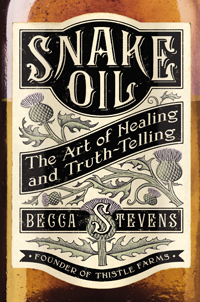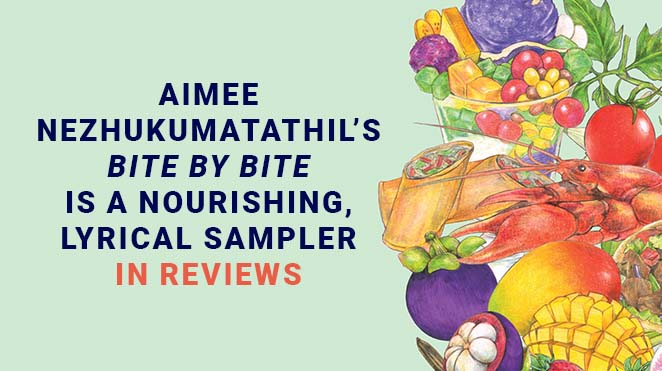Becca Stevens, priest and chaplain at St. Augustine’s Episcopal Chapel on the Vanderbilt University campus in Nashville, has spent the better part of her adult life trying to help women broken by rape, forced prostitution, homelessness, addiction, and other physical and emotional trauma. In Snake Oil: The Art of Healing and Truth-Telling, her new memoir, Stevens details her own sexual abuse and healing and how her ministry has led to the founding of Thistle Farms, a cottage enterprise run by women in the process of healing themselves.
There was a time when Stevens wasn’t sure her social ministry would ever get off the ground. She was a working mother and the wife of a musician (Marcus Hummon, a songwriter and playwright) who was frequently out of town, and her days already seemed hopelessly full. Nevertheless, she dreamed of a place called Magdalene, a residential community for women wrecked by prostitution and addiction, though she thought she might have to put it off till her own life settled down a bit.
 Then, as she made her way home from work downtown one day, her four-year-old son asked, “Mommy, why is that lady smiling?” He had seen a sign on the Classic Cat strip club: a smiling woman wearing a bikini, cat ears, and a tail. “What do I tell him?” Stevens remembers thinking. “Would I tell my son that it is just how the world is, and some people get paid for dressing up like cats? Would I tell him that some people use each other for their own gain? Would I tell him it’s close to Halloween and not to worry? I decided to tell him that some people don’t respect other people, especially women.” As she considered her son’s short-lived innocence, she felt a renewed call to try to help women damaged by prostitution, trafficking, and addiction.
Then, as she made her way home from work downtown one day, her four-year-old son asked, “Mommy, why is that lady smiling?” He had seen a sign on the Classic Cat strip club: a smiling woman wearing a bikini, cat ears, and a tail. “What do I tell him?” Stevens remembers thinking. “Would I tell my son that it is just how the world is, and some people get paid for dressing up like cats? Would I tell him that some people use each other for their own gain? Would I tell him it’s close to Halloween and not to worry? I decided to tell him that some people don’t respect other people, especially women.” As she considered her son’s short-lived innocence, she felt a renewed call to try to help women damaged by prostitution, trafficking, and addiction.
In fact, Stevens shares something fundamental with many of the women she has welcomed into the Magdalene community during the past nearly two decades: she, too, was sexually abused as a child. She had the benefit of a supportive family and an education to help keep her from resorting to destructive behavior, but the kind of trauma she suffered is what led an overwhelming number of Magdalene women to lives of pain. When, for example, a thirteen-year-old’s mother trades her for drugs to a pimp who rapes her and then sells her to someone else, as happened to one of the Magdalene women, there seems to be no escaping an unspeakably rough road ahead.
For Stevens herself, abuse came at an already devastating time in her life. When she was six years old, her father—also an Episcopal priest—was killed by a drunk driver on his way home from counseling members of his parish. That’s when friend of Stevens’s father, a powerful member of the church, began making himself welcome in the family’s home. “This man was a snake oil salesman in the worst sense of the word,” Stevens writes, “the purveyor of concoctions made by people who gain power on the backs of the suffering. The abuse I endured was confusing to me. He showed generosity and kindness to my family. Then, when everyone was gone, he would hold me down or hold me in his lap. He was oily and so strong that he could hold me in any position so I couldn’t move. I didn’t know how to respond. In those moments, I felt as if concrete were being poured down the back of my throat. My body felt heavy and my mind would drift off.”
True healing didn’t come until decades later when, already an ordained priest, Stevens went to the home of her abuser and confronted him. The man admitted what he’d done. Stevens suggested he get some help, and she told his wife that their grandchild shouldn’t be left alone with her husband. Stevens told them she’d pray for them, and she left.
 As Stevens opened the first Magdalene house—a place where women are welcomed to stay for two years without cost and are offered a full range of services, including medical and dental care, to help them become self-supportive—she began to recognize the way sexual abuse connected her to many of the women there. “Let me be clear: I am not comparing the abuse I went through to the terrifying stories I have heard over the years from women who have survived life on the streets,” Stevens writes. “Sometimes I don’t know how my friends at Magdalene survived their childhood. My experiences pale in comparison to the suffering I have heard about, but they allowed me to connect and develop a model that is a lavish, intimate testimony that, in the end, love and grace are the most powerful forces for social change in the world. Magdalene has taught me that if we are given the luxury of time, space and community, we can find a healing path. The path we find may be as far as from here to Tibet, we may have to walk it on our knees, and we may not have a great map, but we will have access to it.”
As Stevens opened the first Magdalene house—a place where women are welcomed to stay for two years without cost and are offered a full range of services, including medical and dental care, to help them become self-supportive—she began to recognize the way sexual abuse connected her to many of the women there. “Let me be clear: I am not comparing the abuse I went through to the terrifying stories I have heard over the years from women who have survived life on the streets,” Stevens writes. “Sometimes I don’t know how my friends at Magdalene survived their childhood. My experiences pale in comparison to the suffering I have heard about, but they allowed me to connect and develop a model that is a lavish, intimate testimony that, in the end, love and grace are the most powerful forces for social change in the world. Magdalene has taught me that if we are given the luxury of time, space and community, we can find a healing path. The path we find may be as far as from here to Tibet, we may have to walk it on our knees, and we may not have a great map, but we will have access to it.”
As the Magdalene community grew—there are now six houses in Nashville—founding a business to support the program became a necessity. Magdalene women often have lengthy arrest records, lack of work history and training, and little education. Finding employment for them was difficult, and Stevens wanted to start an entrepreneurial enterprise that would put them to meaningful work and help sustain the Magdalene program too. Soaking one night in the bathtub, the idea hit her: “The work needed to be something that walked hand in hand with healing body, mind, and spirit,” she writes. Thistle Farms—which makes and sells natural bath and beauty products sold in over 200 retail outlets around the world—was born.
Thistle Farms got its name, Stevens writes, because “thistles grow on the streets and in the alleys where the women of Magdalene and Thistle Farms have walked. But Thistles have a deep taproot that can work its way through thick concrete and survive drought. And in spite of their prickly appearance, their soft purple center makes thistles mysterious and gorgeous flowers. Being a thistle farmer means the world is our farm. Harvesting thistles is a way of walking in the world and choosing to love parts of creation that others have forgotten or condemned.”
Equal parts journal, spiritual guide and snake-oil history lesson—which even includes recipes—Snake Oil is a stirring account of one woman’s vision for justice and healing on behalf of people whose problems seem nearly insurmountable. But Becca Stevens has opened her arms, heart, and ministry to dozens of women that society believes are beyond hope and has given them vision, work, and health. It’s difficult to imagine a more inspirational journey.
As part of the Salon@615 series, Becca Stevens will discuss and sign Snake Oil: The Art of Healing and Truth-Telling on March 12 at 6:15 p.m. Doors open at 5:45, and the event is free.
Tagged: Nonfiction





